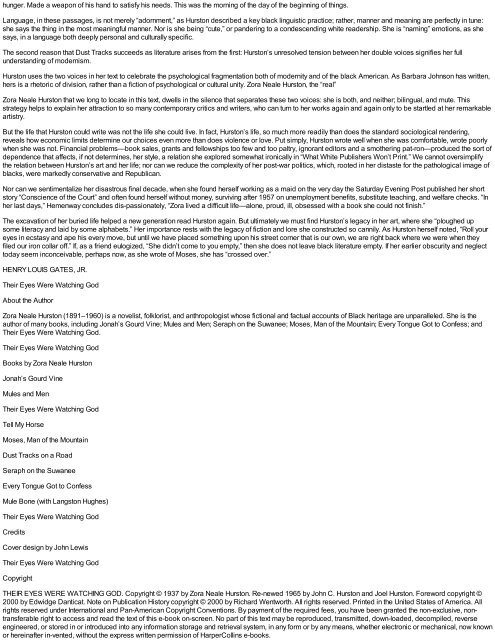Their Eyes Were Watching God - Get a Free Blog
Their Eyes Were Watching God - Get a Free Blog
Their Eyes Were Watching God - Get a Free Blog
You also want an ePaper? Increase the reach of your titles
YUMPU automatically turns print PDFs into web optimized ePapers that Google loves.
hunger. Made a weapon of his hand to satisfy his needs. This was the morning of the day of the beginning of things.<br />
Language, in these passages, is not merely “adornment,” as Hurston described a key black linguistic practice; rather, manner and meaning are perfectly in tune:<br />
she says the thing in the most meaningful manner. Nor is she being “cute,” or pandering to a condescending white readership. She is “naming” emotions, as she<br />
says, in a language both deeply personal and culturally specific.<br />
The second reason that Dust Tracks succeeds as literature arises from the first: Hurston’s unresolved tension between her double voices signifies her full<br />
understanding of modernism.<br />
Hurston uses the two voices in her text to celebrate the psychological fragmentation both of modernity and of the black American. As Barbara Johnson has written,<br />
hers is a rhetoric of division, rather than a fiction of psychological or cultural unity. Zora Neale Hurston, the “real”<br />
Zora Neale Hurston that we long to locate in this text, dwells in the silence that separates these two voices: she is both, and neither; bilingual, and mute. This<br />
strategy helps to explain her attraction to so many contemporary critics and writers, who can turn to her works again and again only to be startled at her remarkable<br />
artistry.<br />
But the life that Hurston could write was not the life she could live. In fact, Hurston’s life, so much more readily than does the standard sociological rendering,<br />
reveals how economic limits determine our choices even more than does violence or love. Put simply, Hurston wrote well when she was comfortable, wrote poorly<br />
when she was not. Financial problems—book sales, grants and fellowships too few and too paltry, ignorant editors and a smothering pat-ron—produced the sort of<br />
dependence that affects, if not determines, her style, a relation she explored somewhat ironically in “What White Publishers Won’t Print.” We cannot oversimplify<br />
the relation between Hurston’s art and her life; nor can we reduce the complexity of her post-war politics, which, rooted in her distaste for the pathological image of<br />
blacks, were markedly conservative and Republican.<br />
Nor can we sentimentalize her disastrous final decade, when she found herself working as a maid on the very day the Saturday Evening Post published her short<br />
story “Conscience of the Court” and often found herself without money, surviving after 1957 on unemployment benefits, substitute teaching, and welfare checks. “In<br />
her last days,” Hemenway concludes dis-passionately, “Zora lived a difficult life—alone, proud, ill, obsessed with a book she could not finish.”<br />
The excavation of her buried life helped a new generation read Hurston again. But ultimately we must find Hurston’s legacy in her art, where she “ploughed up<br />
some literacy and laid by some alphabets.” Her importance rests with the legacy of fiction and lore she constructed so cannily. As Hurston herself noted, “Roll your<br />
eyes in ecstasy and ape his every move, but until we have placed something upon his street corner that is our own, we are right back where we were when they<br />
filed our iron collar off.” If, as a friend eulogized, “She didn’t come to you empty,” then she does not leave black literature empty. If her earlier obscurity and neglect<br />
today seem inconceivable, perhaps now, as she wrote of Moses, she has “crossed over.”<br />
HENRY LOUIS GATES, JR.<br />
<strong>Their</strong> <strong>Eyes</strong> <strong>Were</strong> <strong>Watching</strong> <strong>God</strong><br />
About the Author<br />
Zora Neale Hurston (1891–1960) is a novelist, folklorist, and anthropologist whose fictional and factual accounts of Black heritage are unparalleled. She is the<br />
author of many books, including Jonah’s Gourd Vine; Mules and Men; Seraph on the Suwanee; Moses, Man of the Mountain; Every Tongue Got to Confess; and<br />
<strong>Their</strong> <strong>Eyes</strong> <strong>Were</strong> <strong>Watching</strong> <strong>God</strong>.<br />
<strong>Their</strong> <strong>Eyes</strong> <strong>Were</strong> <strong>Watching</strong> <strong>God</strong><br />
Books by Zora Neale Hurston<br />
Jonah’s Gourd Vine<br />
Mules and Men<br />
<strong>Their</strong> <strong>Eyes</strong> <strong>Were</strong> <strong>Watching</strong> <strong>God</strong><br />
Tell My Horse<br />
Moses, Man of the Mountain<br />
Dust Tracks on a Road<br />
Seraph on the Suwanee<br />
Every Tongue Got to Confess<br />
Mule Bone (with Langston Hughes)<br />
<strong>Their</strong> <strong>Eyes</strong> <strong>Were</strong> <strong>Watching</strong> <strong>God</strong><br />
Credits<br />
Cover design by John Lewis<br />
<strong>Their</strong> <strong>Eyes</strong> <strong>Were</strong> <strong>Watching</strong> <strong>God</strong><br />
Copyright<br />
THEIR EYES WERE WATCHING GOD. Copyright © 1937 by Zora Neale Hurston. Re-newed 1965 by John C. Hurston and Joel Hurston. Foreword copyright ©<br />
2000 by Edwidge Danticat. Note on Publication History copyright © 2000 by Richard Wentworth. All rights reserved. Printed in the United States of America. All<br />
rights reserved under International and Pan-American Copyright Conventions. By payment of the required fees, you have been granted the non-exclusive, nontransferable<br />
right to access and read the text of this e-book on-screen. No part of this text may be reproduced, transmitted, down-loaded, decompiled, reverse<br />
engineered, or stored in or introduced into any information storage and retrieval system, in any form or by any means, whether electronic or mechanical, now known<br />
or hereinafter in-vented, without the express written permission of HarperCollins e-books.


